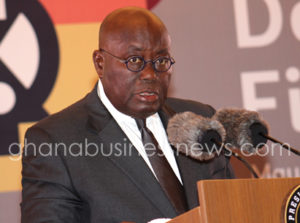Supreme Court dismisses application to stop President from appointing new EC boss

The Supreme Court on Tuesday dismissed an Interlocutory injunction application seeking to stop the President, Nana Addo-Dankwa Akufo Addo from appointing a new chairperson for the Electoral Commission.
The seven member panel presided over by Mr Justice Julius Ansah held that Article 2 (2) of the 1992 Constitution expressly provides remedies in an event where the substantive matter succeeds.
The apex court of the land indicated that it would refrain from commenting on the substantive matter since that may prejudice it.
It therefore unanimously dismissed the interlocutory injunction and referred the plaintiff to go for the legal Profession Etiquette rules.
The court earlier on realised that the writ and the affidavit had been signed by the plaintiff and quizzed the applicant’s lawyer, Mr Chris Akumey whether or not his client was a lawyer or not.
It further granted an application for extension of time to enable the Attorney General to file its statement of case in the substantive matter that sought to invoke the inherent jurisdiction of the court.
Fafali Nyonator a citizen of Ghana through her counsel proceeded to the court with an interim injunction application contending that the removal of Charlotte Osei, a former Electoral Chairperson, was unlawful.
The former EC boss was removed following adverse findings against her and her two other Deputies, Georgina Opoku Amankwah and Amadu Sulley by the Chief Justice’s Committee.
The Plaintiff further held that the Chief Justice Committee which recommended the removal former EC boss infringed on the 1992 Constitution.
Ms Nyonator was therefore praying the court to stop the President from appointing a new EC Chair pending the final determination of the substantive case.
She was also seeking the orders of the court to halt the President from going ahead with the procedures that would confirm Mrs Jean Mensa’s, former Institute of Economic Affair director’s appointment as the new Electoral Commission Chairperson.
Mr Akumey, counsel for Ms Nyonator earlier on argued that they were before the court following their application for interim injunction filed on July 18, this year restraining the President from appointing any person to the position of the EC chair as well committing other persons for the other positions at the Commission.
Mr Akumey recounted that following some development in the matter his client followed up the injunction application
He said the essence of the application was to assist in the entrenchment of the rule of law and seek legal remedies of the Constitution.
“We are of the view that the application for injunction is appropriate to arrest further infringement of the Constitution of Ghana as well as arrest any Constitutional Legal crisis if the application was not granted.
Assuming the application is not granted we would be having two Electoral Commissioners recognised by the President and the Supreme Court of Ghana.”
Mr Akumey said the application “if granted would prevent the insult of the Justice system and the rule of law and prevent the clash between the Supreme Court and the Executive.”
Mr Godfred Yeboah Dame, Deputy Attorney General (AG) opposed the grant of the interim injunction saying the application had no merit.
Mr Dame said Article 2 (2) made provision for remedies in the case the application was refused.
According to the deputy AG the plaintiff should have compelling reasons to warrant the consequential orders of the Supreme Court.
He argued that the role of the EC chair could not be down played in national elections and referendum in event of creating new regions.
Other Justices on the panel of the Supreme Court were: Jones Doste, Anin Yeboah, Paul Baffoe-Bonnie, Sule Gbadegbe, Mrs Vida Akoto Bamfo and Yaw Appau.
Source: GNA
